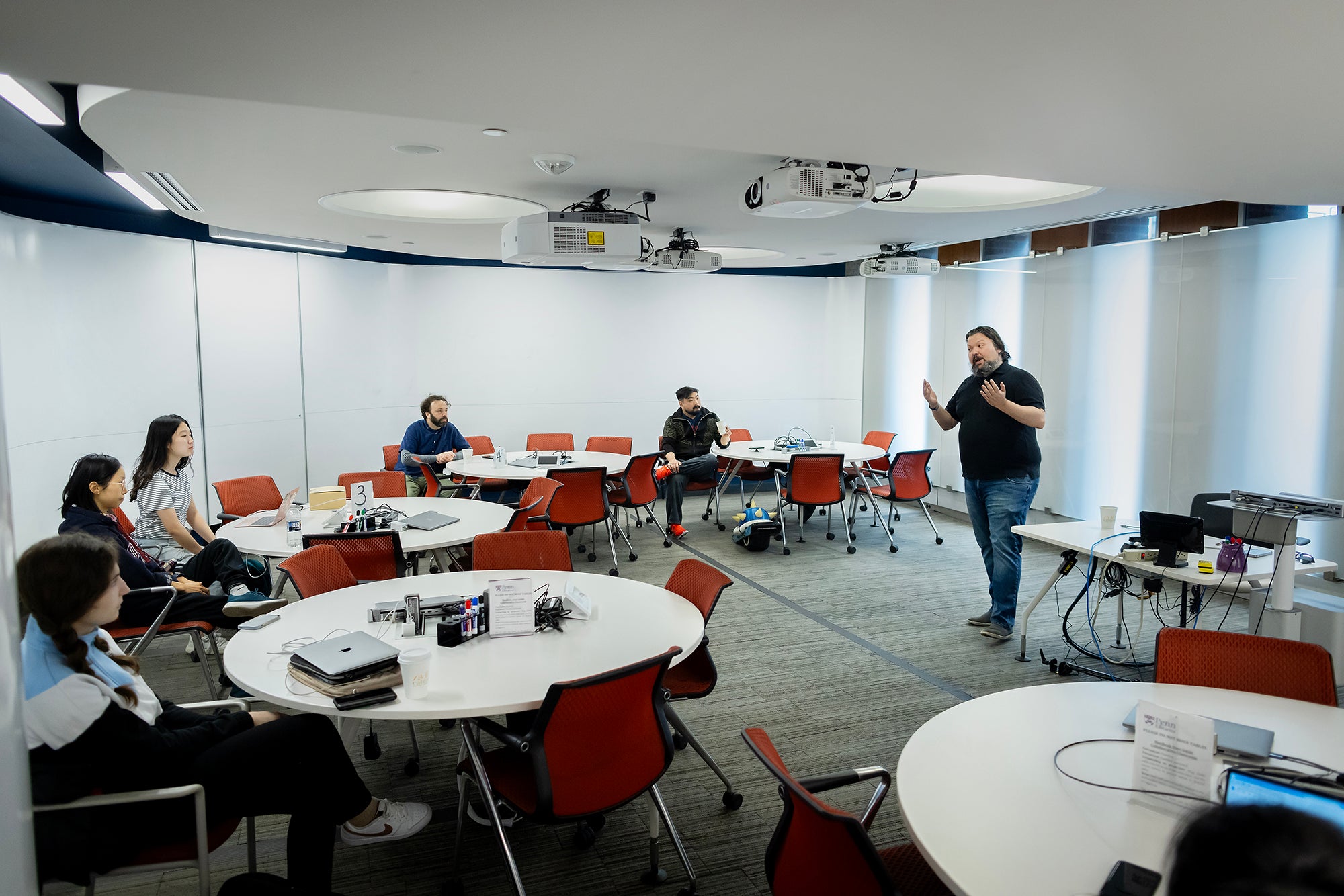What’s your favorite movie? Favorite subject? What would you bring to a picnic? What do you do to relax? Thinking of quick answers to these questions can help students prepare for the job market, says J. Michael DeAngelis, senior associate director of communications and technology at Career Services.
If you stumbled over a response, you’re not alone, DeAngelis says. “People get hung up on right answers and wrong answers,” he says.
A former theater major, published playwright and podcast creative, DeAngelis runs a semiannual workshop, “Improv for Interviewing,” that uses games and techniques from the theater world to guide students to enter the job market by thinking on their feet.
“Improv is all about keeping the conversation going,” he says. “If you’re in the interview, they already think you can do the job.”
The interview is a way to assess soft skills and interpersonal communication, but many people panic and seize up over simple questions. Everyone gets nervous, DeAngelis says. “I was nervous walking over here today,” he told a group at an April 16 session in Van-Pelt Dietrich Library Center. “Oh, this is such a weird workshop, are people going to like it?”
Bianca Vama, a fourth-year neuroscience major from New York City, is applying to medical schools and interviewing for summer programs. She attended the spring workshop as a good way to get advice and to practice and better handle unexpected prompts, she says.
Lisa Yang, who will graduate with a master’s in higher education from the Graduate School of Education in May, found the workshop on Career Services’ Handshake, a platform that gives students and alumni access to employers, job and internship postings, networking resources, and events. “I’m looking for opportunities to sharpen my interview skills,” she says.
Originally from Beijing, Yang is applying for academic advising and program coordinator positions in the U.S. and China but struggles to bring her authentic point of view and have honest, normal conversations while under pressure. “I always overthink and over-prepare for an interview,” she says.
For one exercise, DeAngelis had the group stand in a circle. Holding a small stuffed Ewok that “will bite you on the arm if you hold it too long,” DeAngelis asked Yang a question, tossing the toy as he waited for an answer.
“Lisa, what’s your favorite vacation?” he asked.
“Uh … what kind of vacation?” Yang responded.
“Doesn’t matter,” DeAngelis said. “There’s no wrong answer.”
“When I was in middle school, I went to Europe,” Yang answered. Yang tossed the stuffed animal and addressed another participant, “What have you been watching lately?”
DeAngelis says he has led this workshop a half-dozen times. He first started over Zoom in the summer of 2020, at the request of the Center for Undergraduate Research & Fellowships. “They were hearing from folks on campus that students were really stumbling over the personal, anything that didn’t have to do with their academics or research,” he says. “That was in line with what we were hearing from employers.”
Conversations, small talk, and storytelling are transferrable skills that are helpful in any profession, he says. “I’m such a strong believer in the liberal arts, particularly being a theater major,” he says. “I can rely on that training that I have to ask questions, to keep a conversation going, to listen.”
The workshop has traditionally attracted international students, who have the additional challenge of answering off-the-cuff questions in a foreign language, DeAngelis says. Regardless of reticence or language difficulties, everyone ends up participating, he says. “I’ve never had to pull teeth. Sometimes you get that one person who’s like, ‘No, no, no,’ … And then they get up and do the last one.”
For students looking to practice interviewing skills, Career Services offers mock-interview practice for both in-person and Zoom meetings. They also have rooms that students can reserve to speak with potential employers. “Improv for Interviewing” workshops and other services can be requested through the Career Services website, DeAngelis says.
Nicholas Yohn, a third-year student studying finance and statistics at the Wharton School, already knows where he’s going to land this summer. Originally from Hoboken, New Jersey, Yohn will be interning at a private equity firm and wants to make the most of his experience.
“I’m going to be meeting a lot of new people, trying to understand the firm,” Yohn says. He is also hoping to entertain future job offers and says, “This is for me to be able to keep up the conversation and think on my feet.”
Private equity is a relationship-driven business, Yohn says, and he wants to start making contacts and learning to talk about himself in professional settings “in a way that’s not overly prepped.”
In the workshop, Yohn volunteered to play a scene where two participants are given established roles—in his case, a student called into the principal’s office—and secret identities—the principal is also his long-lost father!—a detail revealed later in the conversation.
The exercise is relevant to interviewing, Yohn says. A lot of firms ask potential hires scenario-based questions based on ethics, deadlines, or interpersonal conflict, giving interviewees 20 seconds to film a response with no re-dos, he says.
“I’ve been hit with some of those curveballs,” he says. “It’s a skill I’m trying to work on.”

